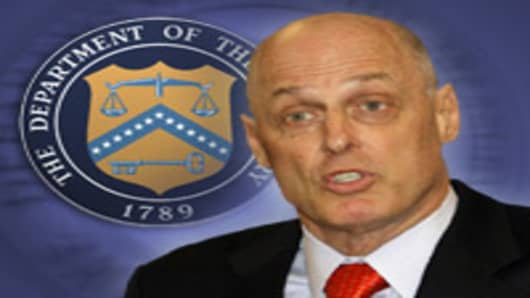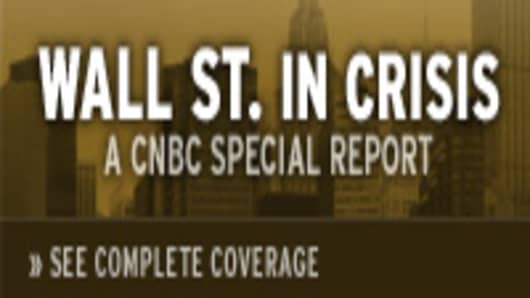Treasury Secretary Henry Paulson is working on a plan that would set up a government facility to take on bad debts from financial institutions, preventing a worsening of the global credit crisis, Wall Street sources have told CNBC.
The facility would be similar to the Resolution Trust Corporation, which was set up in the late 1980s to take on all the failed thrift assets during the savings and loan crisis, these sources said.
Paulson is said to be shopping the proposal to lawmakers in Congress, a congressional aide told Reuters.
Such a move, according to its advocates, would allow banks to shovel bad debt off their balance sheets and send them back to business as usual.
In turn, that could allow the housing market to recover because it would restore banks willingness to lend.
"This will bring real trust back into the market." Donald Marron, chairman of Lightyear Capital, said on CNBC. "It would free up real, spendable capital in these organizations. They can use that to make loans, to make transactions and to build confidence in the system. This is a confidence crisis."
The news sparked a big rally in stocks after a day in which investors remained nervous about the spreading effects the global credit crisis. Europe and Asiaclosed lower.
Stocks also got a lift after Britain announced Thursday that it would bar short-selling until January.
Meanwhile, Calpers, the nation's biggest pension fund, said it would no longer lend out Morgan Stanley or Goldman Sachs shares to short-sellers, who profit from stock declines, the Wall Street Journal said. Both stocks have been pummeled recently by heavy short-selling.
Both decisions came after U.S. securities regulators reimposed tightener rules on short-sellers.
Meanwhile, U.S. asset manager Putnam Investments said it had closed its $15 billion Prime Money Market Funddue to redemption pressures. That followed Tuesday's news that another big money-market fund, Reserve Primary Fund, fell below $1 a share in net asset value.
For Investors
- Are Stocks Low Enough to Buy Now?
- Is Your Money-Market Fund Safe? Find Out
- Slideshow: Biggest Chapter 11 Cases in US History
- Eight Tips for Investing in Hard Times
- Need Safety? Take a Look at Bonds
- What If You're a Client of Lehman, Merrill or AIG?
- Have an AIG Insurance Policy? Don't Fret
- How You Can Protect Your Money
Overnight, the Federal Reserve announced coordinated moves with five of the world's major central banks to add up to $180 billion in liquidity to global money markets, which had virtually frozen up this week after upheaval on Wall Street.
The move gave some reassurance to panicked investors and sparked rallies, though stocks later lost ground amid concern about more failures of big financial institutions.
Morgan Stanley topped the list of major financial firms scrambling to find a buyer, with CNBC reporting that the No. 2 Wall Street investment bank was in advanced merger talks with Wachovia.
Morgan, whose shares are down 50 percent this month, has also approached Chinese sovereign wealth fund China Investment Corp about boosting its stake in Morgan Stanley,following a $5 billion investment late last year.
Goldman Sachs Group , the other surviving independent Wall Street investment bank, is also facing concern that the credit crunch could constrict the short-term funding that it traditionally relied on.
Washington Mutual , the struggling savings and loan, has also put itself up for auction.
And Lloyds TSB sealed a rescue takeover of HBOS to create a dominant British mortgage and savings bank in a $22 billion deal helped through by the government.
The concerted action by central banks follows Wednesday's rout in financial markets, roiled by fears of more Wall Steet failures after a week that saw Lehman Brothers file for bankruptcy, Merrill Lynch lose its independence and a $85 billion U.S. government bailout of insurance giant AIG.
AIG, a component of the Dow Jones Industrial Average, will be replaced by Kraft Foods, it was announced Thursday.
Nervous investors are scrambling into U.S. Treasuries, sending yields on one-month paper to just 0.010 percent, while three-month rates traded as low as 0.020 percent, the lowest since at least 1954.
Meanwhile, the Volatility Index, Wall Street's main barometer of investor fear, closed at levels not seen since late 2002.
“We’re just advising clients to hold it out,” said Patrick DeMay, operations manager at Carver Financial Serivces. “The biggest insurance companies and broker-dealers looking weak doesn’t help. Some of the companies being brought down in stock values are actually very stable companies but the confidence has eroded for entire sectors, sometimes not rightfully so.”
—Reuters contributed to this report.



